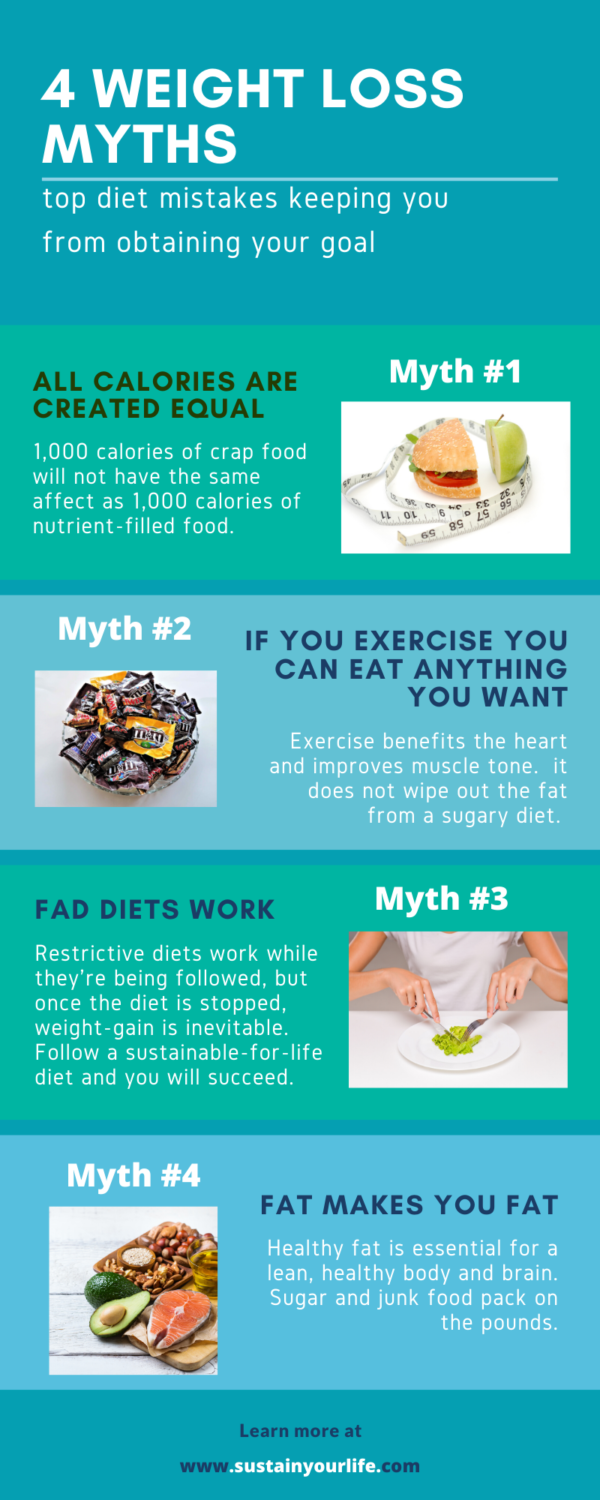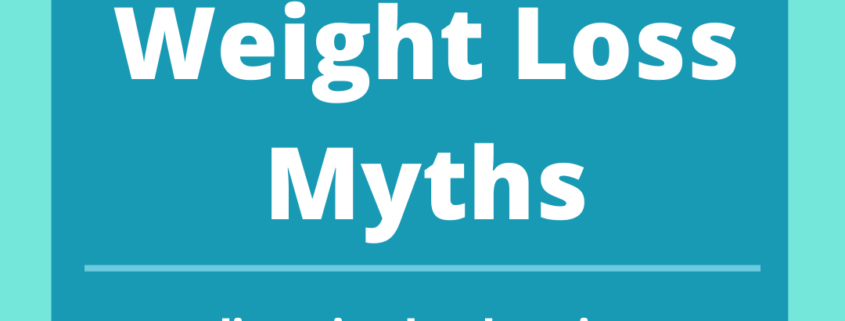4 Weight Loss Myths
How to achieve your weight loss and health goals now.
 Myth #1
Myth #1
All Calories Are Created Equal
Studies show that all calories are not created equally. Let’s compare 1,000 calories of vegetables to 1,000 calories of candy, soda, and fast food. Your body reacts to sugar by increasing blood sugar. Then it must increase insulin to decrease the blood sugar. Consistently high levels of insulin cause weight gain. Especially mid-section weight gain. Also, consistently high levels of insulin increase your risk of type 2 diabetes, heart disease and more. In contrast, when you eat 1,000 calories of vegetables your body takes those nutrients and puts them to work repairing cells, fighting inflammation, decreasing body fat and has the added benefit of decreasing symptoms of chronic disease.
Myth #2
If You Exercise, You Can Eat Anything You Want
Exercise is a necessary component of healthy living. It keeps the heart healthy and builds muscle tone. Unfortunately, though, fat caused by consistent levels of high insulin will not be reduced at the gym. Recovering from a bad diet starts with food. Sustainable changes such as lowering unhealthy carbs and sugar and increasing healthy foods such as quality protein, vegetables, and healthy fats, will make a remarkable difference to your body. Go to the gym to increase heart health and muscle tone, go to the kitchen to decrease insulin-inducing fat.
Myth #3
Fad Diets Work
This is one that really messes with weight and health. Fad diets contribute to yo-yo dieting. And anybody who has tried several diets only to put weight back on can attest to the fact that constantly switching to the latest fad diet will not garner sustained weight loss. Most fad diets are simply not feasible or healthy. They can indeed help you lose weight momentarily, but what happens when you stop the diet? Of course, bad eating habits sneak back in and weight loss is short-lived. If you want to lose weight for life, you need a sustainable diet that you can live with for the rest of your life.
Myth #4
Fat Makes You Fat
Back in the 1970’s it was suddenly being touted that fat and cholesterol were making people fat and sick. How convenient for the sugar, junk food, and fast food industry. Suddenly everybody was dumping healthy fat like pastured beef, whole dairy foods, avocados, avocado oil, and coconut oil and switching to high carb foods such as pasta, bagels, breads, and cereals. Every meal contained some type of wheat item. Foods with chemicals, toxins, and too much sugar, took over our pantries and diets.
Today obesity and chronic disease are wide-spread and lowering our quality of life. The culprit of this dilemma? The sugar industry, as far back as the 1950’s has been pushing the idea that sugar is not an unhealthy food and does not contribute to disease or obesity. The sugar industry has cleverly and consistently tried to refute studies that show that sugar is a disease-causing food and argue that fat is unhealthy. We don’t need studies to prove how wrong this is though. Just look around you. As we stopped eating healthy fat and started consuming more unhealthy, high carb meals, chronic disease has exponentially increased. It doesn’t take a rocket scientist to see the connection between high sugar intake, weight gain, and chronic disease. If your goal is to lose weight and decrease symptoms of chronic disease, then start by decreasing added sugar and increasing healthy fat and healthy food.
Click for your free copy A Guide to Dietary Fats
Learn more about how you can change your health today!
Cheers To Your Health,
Deb
Like what you read? Please share and comment below.
Sources:
https://www.thelancet.com/journals/lancet/article/PIIS0140-6736(17)32252-3/fulltext
https://www.npr.org/sections/thetwo-way/2016/09/13/493739074/50-years-ago-sugar-industry-quietly-paid-scientists-to-point-blame-at-fat
https://www.health.harvard.edu/staying-healthy/the-truth-about-fats-bad-and-good




Leave a Reply
Want to join the discussion?Feel free to contribute!